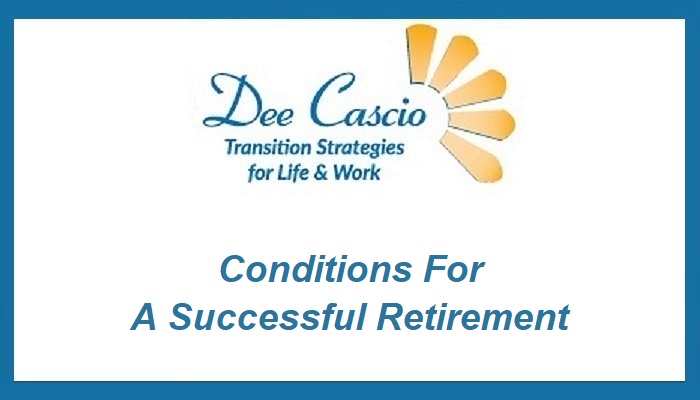Do you know the conditions for a successful retirement? You can get them right more easily than you might think.
First, do not follow the crowd. I know this seems counterintuitive. Explore what you need for your ideal retirement instead of defaulting to someone else’s plan. There are so many different interests, needs, activity levels, and connections to family/friends for each of us that following the crowd may leave you disillusioned and unfulfilled.
Even if you are used to others leading, do not follow this pattern in retirement planning. It can be scary to have no idea how to plan because “you do not know what you do not know” but give yourself time to explore. Do some introspective work to clarify what you need in this new phase of life. Your direction in retirement should be from the inside out, not from the outside in. Maintaining autonomy in making these important decisions is imperative to insure that you will be living your own retirement lifestyle and not someone else’s.
Second, pace your retirement to meet your own needs. Some careers allow people to retire gradually over time by reducing their schedule one day at a time over a period of months. Others have a specific age that they have to retire. For decades, pilots were forced to retire at 60 and this was devastating for many pilots whose only love was flying. This age limit has now been extended to a more realistic age of 65. Some law firms require their partners to retire at a certain age to make room for younger partners. There is no transition time but there is an opportunity to anticipate this transition and plan for it. Fortunately, my psychotherapy profession allows me to phase out gradually so I can pursue other endeavors like retirement coaching, volunteer work, and travel.
Do you have a career that allows you to phase out gradually or one that has a mandatory retirement age? Could you be caught off guard by your company downsizing and offering you an early retirement? Will you be ready?
Third, avoid thoughts and patterns that set one up for failure like
• All I need is a good financial plan and I will be happy in my retirement
• I will be able to figure out what I want to do with my time all on my own
• My spouse will be so happy to be spending more time together every day
Other Conditions For A Successful Retirement
Your retirement plan should be as unique as you are. Think “designer label” instead of “off the rack.” Customize your retirement lifestyle to fit your needs, desires, hopes, dreams, passion, purpose, skills, talents, and finances.
Please also consider the following suggestions:
• Explore professional support and expertise available in designing a successful retirement.
• Communicate with your spouse or partner early and often in your retirement planning.
• Refrain from following the crowd and individualize your plans to reflect who you are and what you need, whether you are married or single.
• Failing to plan often leads to planning to fail. Anticipate this transition by planning for it. Embrace this exciting new phase of your life by considering all of the options ahead of time. Explore a phase out plan within your career area if possible. Be thinking now about other possibilities.
• Read “What do I need for a successful retirement?”
What conditions for a successful retirement do you already have in place? Which do you need to explore or act on?
